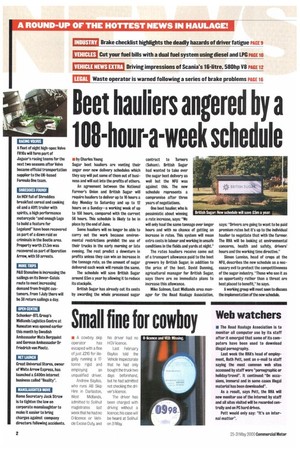Beet hauliers angered by a 100-hour-a-week schedule
Page 4

If you've noticed an error in this article please click here to report it so we can fix it.
by Charles Young Sugar beet hauliers are venting their anger over new delivery schedules which they say will put some of them out of business and will eat into the profits of others.
An agreement between the National Farmer's Union and British Sugar will require hauliers to deliver up to 16 hours a day Monday to Saturday and up to 12 hours on a Sunday—a working week of up to 108 hours, compared with the current 56 hours. This schedule is likely to be in place by the end of June.
Some hauliers will no longer be able to carry out the work because environmental restrictions prohibit the use of their trucks in the early morning or late evening. The rest predict a downturn in profits unless they can win an increase in the tonnage rate, as the amount of sugar delivered each week will remain the same.
The schedule will save British Sugar around £5m a year by allowing it to reduce its stockpile.
British Sugar has already cut its costs by awarding the whole processed sugar contract to Turners (Soham ). British Sugar had wanted to take over the sugar beet delivery as well but the NFU was against this. The new schedule represents a compromise after three years of negotiations.
One beet haulier, who is pessimistic about winning a rate increase, says: We will only haul the same tonnage over longer hours and with no chance of getting an increase in rates. This system will mean extra casts in labour and working in unsafe conditions in the fields and yards at night."
The rates hauliers receive come out of a transport allowance paid to the beet growers by British Sugar. in addition to the price of the beet. David Dunning, agricultural manager for British Sugar, says there are no immediate plans to increase this allowance.
Mike Salmon, East Midlands area manager for the Road Haulage Association, says: 'Drivers are going to want to be paid premium rates but it's up to the individual haulier to negotiate that with the farmer. The RHA will be looking at environmental concerns, health and safety, drivers' hours and the working time directive."
Simon Lunniss, head of crops at the NFU, describes the new schedule as a necessary evil to protect the competitiveness of the sugar industry. "Those who see it as an opportunity rather than a threat are best placed to benefit," he says.
A working group will meet soon to discuss the implementation of the new schedule.
















































































































